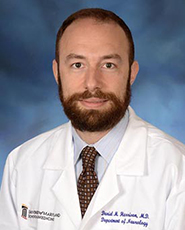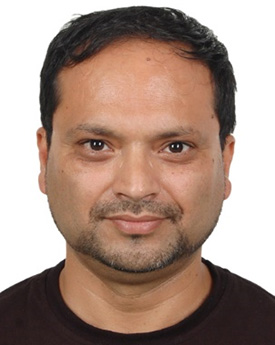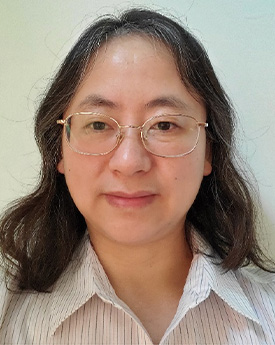UM Multiple Sclerosis Neuroimaging Biomarker Research Group Team

Daniel Harrison, MD
Principal Investigator
Associate Professor of Neurology
Dr. Harrison is a clinically trained neurologist, specializing in the treatment of patients with multiple sclerosis and other neuroimmunologic disorders. He is a graduate of The Albert Einstein College of Medicine, where he received his medical doctorate.
He trained in neurology through a residency at Columbia University Medical Center and received further training in clinical care and research in a postdoctoral fellowship at the Johns Hopkins University School of Medicine.
During Dr. Harrison's fellowship, and through a subsequent NIH K23 training grant, he received extensive training in MRI image analysis, clinical research and biostatistics.
NIH, National MS Society and industry grants fund Dr. Harrison's research.

Seongjin Choi, PhD
Senior Research Analyst
Dr. Choi is a biophysicist by training, specializing in the neuroimaging. He received his doctorate in biophysics (MR physics focused) at The Ohio State University (OSU) for his study of NMR microscopy and spectroscopy of submillimeter-sized biological objects.
In post-graduate training at OSU Wexner Medical Center, he investigated the microstructural integrity in the human brain with mild traumatic brain injury and post-stroke.
He also worked on the phosphorous magnetic resonance spectroscopy (31P-MRS) study of mitochondrial bioenergetics in human skeletal muscle at the National Institute on Aging (NIH/NIA).
His research interest is in developing a work-frame capable of comprehensive biophysical characterization of healthy and pathologic brain tissues utilizing MRI-driven, quantitative metrics and combined with clinical measures and machine-learning methods. He joined Dr. Harrison's research group in 2016.

Shishir Dahal , MD, PhD
Postdoctoral Fellow
Dr. Dahal completed his radiology training from National Academy of Medical Sciences Nepal and received his PhD in Radiology from Otago University, New Zealand. In his PhD he investigated translational ability of Spectral Photon Counting CT in vascular imaging. He studied the effectiveness of photon counting CT in identification of the rupture of prone vulnerable atherosclerotic plaques in human arteries.
Currently, he is working on sophisticated MRI technology, including 7- tesla MRI, for identification of and quantification of various types of lesions (white matter lesions, grey matter/cortical lesions, and meningeal inflammation) of multiple sclerosis.
His current research interest includes imaging of vascular and neuronal structures with cutting edge imaging technologies like photon counting CT and high field MRI.

Duha I Awad, BS
Research Analyst
Duha Awad is a research analyst at the UMB Multiple Sclerosis and Neuroimmunology Center. She received her Bachelor of Science in Psychology and a minor in Neuroscience from the University of Maryland, College Park. As an undergraduate Duha worked on multiple projects in epilepsy at the National Institutes of Health and Johns Hopkins University. She implemented machine learning and image processing techniques to detect and localize seizures.
Duha’s research interest lies within the field of Neurology and image processing. Currently she is working on manual segmentation of lesions within Multiple Sclerosis MRI images using various techniques.

Li Jiang, PhD
Research Associate
Dr. Jiang received her BS and MS degree in Electronic Engineering from Sichuan University, China and her Ph.D degree in Biomedical Engineering from the George Washington University. Her Post-doc training at the University of Maryland School of Dentistry.
She was a research technician at the Cornell University Weill Medical College and Memorial Sloan-Kettering Cancer Center where she developed image segmentation algorithms to detect lung nodules and liver tumors on multi-slice CT images. Her doctoral thesis was numerical modeling (Finite Element Method) of the complex thermal-elastic mechanism of breast infra-thermography. Her postdoctoral training was in MRI and bio-neurology in neuropathic pain and she received NRSA individual fellowship from NIH to support her research work.
Her current research interests are in detecting neuroimaging biomarkers (structural and functional) of various diseases, including traumatic brain injury, Parkinson’s diseases, neuropathic pain, epilepsy, neonatal hypoxic ischemic encephalopathy, and multiple sclerosis utilizing multimodal MR neuroimaging (T1, T2, FLAIR, DTI, DKI, fMRI, DCE, and et al), neuropsychological and behavioral techniques.
UM Magnetic Resonance Research and UM Department of Radiology
Members of the MRRC, Rao Gullapalli, PhD, and Jiachen Zhuo, PhD, and members of the Department of Radiology, Erin O'Connor, MD, and Rong Chen, PhD, worked with our team.
The F.M. Kirby Center at The Kennedy Krieger Institute (KKI)
Our partners on 7T MRI projects at KKI are invaluable to our research efforts. Jun Hua, PhD, and Xu Li, PhD, continue to provide extensive assistance and collaborate with us on sequence development and image analysis. Peter van Zijl, PhD, who continues to help to oversee our research, has worked with Dr. Harrison since Dr. Harrison's time at Johns Hopkins.
Collaborators in Machine Learning
Our partners on these projects include Rong Chen, PhD at the University of Maryland, Baltimore, and the laboratory of Cornelia Fermuller at the University of Maryland, College Park.
Collaborators in Adaptive Optics
Our partners on this project includes Osamah Saeedi, MD from the University of Maryland, Baltimore and scientists at the Food and Drug Administration (Daniel X. Hammer, PhD and Zhuolin Liu, PhD).
Join Our Lab
We are frequently looking for talented researchers to join our team.
Graduate students, postdoctoral fellows or staff researchers with experience in medical image processing techniques, medical image analysis, MRI protocol development, OCT image analysis and biomarker research can contact Dr. Harrison at dharrison@som.umaryland.edu.
